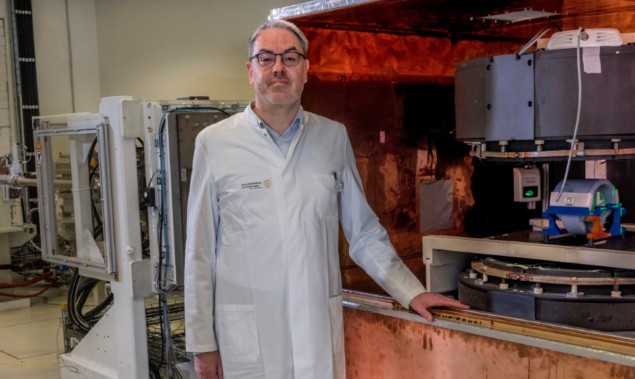
The Institute of Physics and Engineering in Medicine (IPEM) has announced the winners of its two 2019 journal awards: the Roberts Prize for the best paper published in Physics in Medicine & Biology (PMB) during the previous year, and the Martin Black Prize for the best paper published last year in Physiological Measurement (PMEA). These annual prizes are jointly awarded by IPEM and the journals’ publisher, IOP Publishing.
The Roberts’ Prize was awarded to Sonja Schellhammer, Aswin Hoffmann and co-authors at OncoRay and IBA. Their winning paper, Integrating a low-field open MR scanner with a static proton research beam line: proof of concept, examines the feasibility of performing real-time MR imaging during proton therapy to improve targeting accuracy (Phys. Med. Biol. 10.1088/1361-6560/aaece8).
The team integrated an MR scanner with a static proton research beam line and tested the MRI performance without the proton beam. MR images of a healthy volunteer and a patient with a soft-tissue sarcoma were sufficient for target volume definition and positioning. Phantom images recorded with and without the proton beam showed no beam-induced image degradation.
The researchers also imaged a sausage sample, without the beam, with energized beam line magnets and during proton irradiation. Difference images between the three conditions revealed a sub-millimetre shift in frequency-encoding direction, which can be corrected for. No additional artefacts or deformations were seen, indicating that neither the beam line magnets nor the beam itself degraded the images.

MRI guidance is feasible for proton therapy
“We are delighted and honoured that our article on the world’s first prototype system that combines an in-beam MRI scanner with a horizontal proton research beam line has been awarded the 2019 Roberts’ Prize,” says Hoffmann. “The appreciation for our work shows that there is a strong scientific interest and urge in efforts to explore the capabilities of MRI-guided proton therapy.”
Analysing big data
The Martin Black Prize was won by John Prince, Siddharth Arora and Maarten de Vos from the University of Oxford. Their paper, Big data in Parkinson’s disease: using smartphones to remotely detect longitudinal disease phenotypes, analysed finger tapping and memory test data collected using smartphones to better understand the longitudinal characteristics of Parkinson’s disease (Physiol. Meas. 10.1088/1361-6579/aab512).
“The application of machine learning in the neuroscience sphere has boomed over the last decade or so and it seems that with every new answer comes ten new questions,” explains Prince. “The intention of my paper was to clarify some of the ambiguity surrounding objective measurement of neurodegenerative diseases, namely Parkinson’s Disease.”
Prince notes that the biggest challenge shared by all artificial intelligence systems in healthcare is how well algorithms perform when used by consumers outside of a clinical environment. “My paper showed how by just using an iPhone regularly in day-to-day life it’s possible to detect neurodegeneration, whilst also highlighting the current shortcomings in the current clinical measurement techniques,” he says.
The suite of algorithms presented in the paper and subsequent publications are scalable to large amounts of longitudinal data. They are also memory efficient, meaning they can easily run on most wearable devices and give real-time feedback to either the user or a clinician.
“I think the same goal is common across both academia and industry and is independent of application – be it neuroscience, cardiology, drug delivery, or genomics – and that is to create affordable and robust algorithms that can be put into the hands of users across the globe to not only improve but also widen access to healthcare,” says Prince.

Journals award ‘best paper’ prizes
Prince and Schellhammer have both been invited to present their papers at IPEM’s annual Medical Physics and Engineering Conference (MPEC), to be held in Bristol in September.



